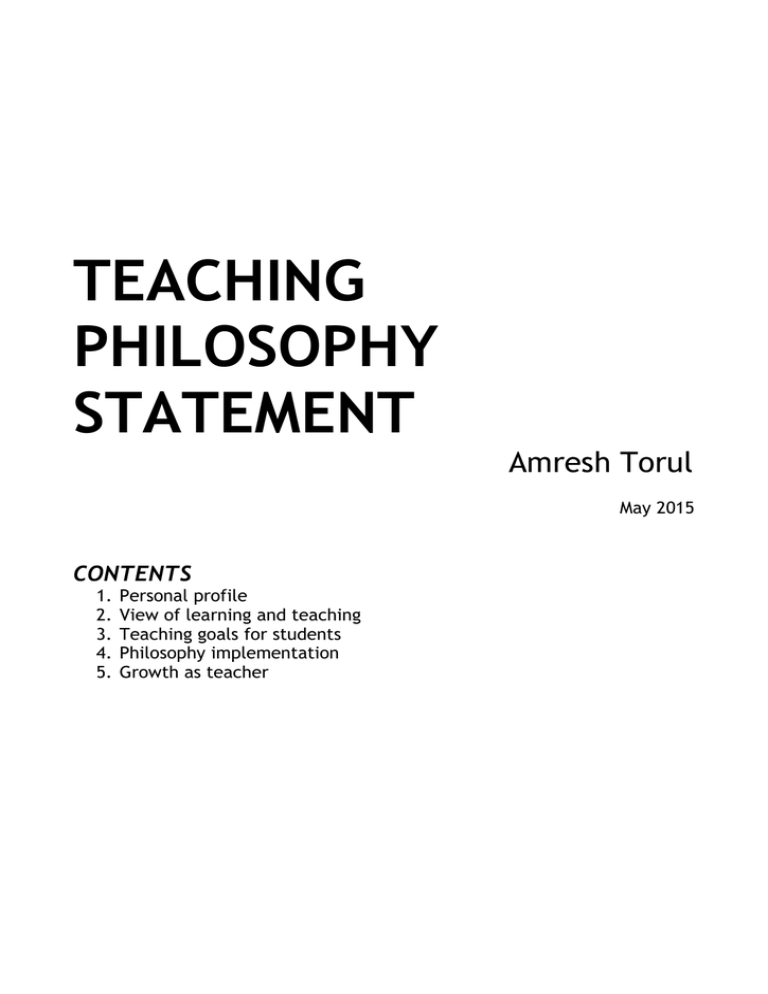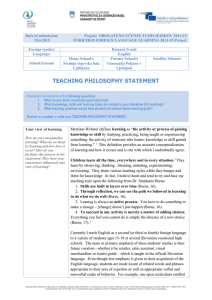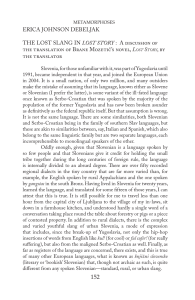Growth as teacher
advertisement

TEACHING PHILOSOPHY STATEMENT Amresh Torul May 2015 CONTENTS 1. 2. 3. 4. 5. Personal profile View of learning and teaching Teaching goals for students Philosophy implementation Growth as teacher Personal profile My name is Amresh Torul. I am 31 years old and was born in the Republic of Mauritius, where we speak English, the official language, French and Mauritian Creole. I have always been passionate about computers and technology, which is why I decided to graduate in the field of computer science. My qualifications include a degree in Computer Science with the University of South Africa (UNISA) and also a professional degree with the British Computer Society (BCS). I also completed a TEFL course in 2014. At the age of 23, I moved to the UK where I eventually spent almost four years. In my time there, I did some freelance work covering a variety of areas in information technology. I also worked as a computer systems administrator/technician for a nursing institution. A great deal of my job involved training and helping the staff on various computing platforms and applications. Looking back at this experience now, it is clear to me that this part of the job was the most enjoyable, mainly due to the interaction with people. In addition to professional exposure, my living experience in London also allowed me to gain a sound understanding and appreciation of a different culture and it is something I will always treasure. In April 2010, I moved to Slovenia which is also my wife’s homeland. The first job that became available to me was a position as “Foreign teacher for English” in the Enriched Foreign Language Learning (EFLL) project led by the National Institute of Education (ZRSŠ). The school recruiting me was Vegova Ljubljana, a secondary school specialising in computer science and electronics engineering. My new employers made it clear to me that my computer skills were decisive in their choice of candidate. I joined the institution in October 2010 and it marked the beginning of an exciting journey for me in the teaching profession. I have been working in the same position at Vegova Ljubljana for five years now. My job at the school is twofold: 1. developing and implementing strategies for disciplinary literacy teaching in the two principal content subjects: computer science and electronics engineering; 2. And facilitating intercultural education through English language teaching. Throughout my entire teaching practice at Vegova Ljubljana, I have also been teaching at their partner school, The Secondary School of Technical Professions, Šiška (SŠTS Šiška), with similar duties for subjects such as mechatronics, electrical engineering and computer science. At several stage of my involvement in the EFLL project, I have been asked to contribute professionally in different roles at the Institute level. I am fully confident that the knowledge and skills I gained during these postings will benefit my career. In the last two years, I have also had weekly lessons at Gimnazija Postojna, where I developed and implemented English language courses for third year students of the gymnasium programme. My roles at the three schools have helped develop my inter-personal, communication and technical skills. Most importantly, after five years of teaching, I am convinced that it is a career that suits me as a person. My goals are firmly set in place and I look forward to working with Slovenian schools and students for many years to come. View of learning Throughout our lives, we are presented with loads of information from various sources. Due to the different circumstances we find ourselves into, we go through many experiences as well. Learning, to me, is a process through which somebody turns the information and experience into concrete and permanent results such as knowledge, skills, behaviours, and attitudes. I personally do not see learning as something that takes place only in a classroom. I believe that any person can learn from anyone, consciously or not. Learning has been defined by many academics around the world, and the words “cognitive process of acquiring skills and knowledge” come into common usage. This is of course not a coincidence. Learning is a scientific process that occurs in the brain of an individual, involving sensory, short-term and long-term memory. In a controlled setting like a classroom, I believe the best way to learn is not to be constantly lectured but to take part in activities that allow learners to try new things in safety, without fear of failure or bad grades. The activities should ideally provide real-world examples and ensure that the lesson content applies to the students’ learning context. View of teaching A teacher uses a range of teaching methods, aiming to impart knowledge or skill. The role of a teacher in a classroom has evolved with time. As a foreign teacher in the EFLL project, I fully support the learner-centred approach. Thanks to the training and support provided by the Institute, I have come to appreciate the idea that teaching is the facilitation of student learning. The learner should be placed at the centre of education, and the teacher should know their students very well in order to make a difference in their education. I think it would be very difficult for a foreign teacher to add real value to the education of their students, unless they adopt this approach. As a facilitator of learning, the teacher should help the learner to get to their own understanding of the content. They should provide clear guidelines and create the environment for the learner to successfully arrive at their own conclusions. Moreover, a teacher should promote interaction in the lesson through continuous dialogue with their learners. I thrive to search for and present up-to-date contents to my students because I feel responsible to do so as a teacher. After that, challenging them intellectually is indeed very important for the subjects I am involved in, so as to support them in becoming effective thinkers. Above all, my philosophy when it comes to teaching is all about the human side of things. I treat each of my students as an individual with their own likes, dislikes, preferences and issues. My mission in every class is to reach out to my students, know them, understand them and then adapt my approaches accordingly. I have to be careful, however, to remain reasonably fair to all of them. I am fully aware of the life-long impacts (positive or negative) a teacher can have on a student. For this reason, I believe a teacher should always be extra careful about their behaviour. I always make it a point to set a good example for my students to follow. It is the only way I think I can gain my students’ respect. Teaching goals for students DISCIPLINARY LITERACY My overall goal for disciplinary or academic literacy is that my students learn how to be proficient in technical English. Both my schools are involved in technical fields: computer science, electrical and electronics engineering and mechatronics. Having studied computer science at tertiary level, the majority of my duties is related to what can also be called English for Specific Purpose (ESP). Prerequisites I expect my students to have a very deep knowledge of the content because this is also expected of them by their Slovenian teachers. It is also a huge advantage if a student has genuine interest in the field of technology. Such students usually read and watch a great deal of online content about technical topics. This definitely gives me more to work with in class. Goals/expected outcomes As far as English language is concerned, I usually stress a lot of importance to the terminology related to a specific discipline. This includes being able to properly read, explain, write and use the professional terms in example sentences. Another frequent goal is to carry out numerous types of language work based on authentic materials (articles, product reviews, advertisements, company websites, etc.) Additionally, I pay a lot of attention to the writing of technical documentation, especially for students who commit to research and development tasks. It is of paramount importance, in my opinion, that my students get used to the style of writing required in such documents. These skills will prove to be very handy in their professional career if they ever have to work on international projects, which is becoming more and more likely in this day and age. As stated previously, my English lessons are usually rich in professional content. The last thing I would like to see, however, is that my students blindly accept everything that is presented to them. Therefore, another significant and typical feature of my lessons is to always wrap up a topic with a critical thinking task. It gives students an excellent opportunity to evaluate the content, reflect on it and express their opinion while making good use of the English language. INTERCULTURAL EDUCATION Our world is not called a global village for nothing and our students understand this world they live in. Being a foreign teacher, it makes perfect sense that I put my foreignness and previous experiences abroad to use. In me, my students constantly get access to a foreigner to speak English to, which makes a very authentic situation. The main goal is to raise students’ awareness of the differences between cultures, with the English language being always central to the individual lesson goals. This is one of the main reasons why I fully support exchange programmes at every level of secondary schooling. My ultimate goal for students having me for all four years is that they graduate as true global citizens who have it in them to adapt to different cultures in their personal and professional lives. Philosophy implementation To achieve my teaching goals, I have to collaborate with all the teachers of technical subjects at my schools. I am regularly present during practical lessons, observing students while they conduct experiments, circulating the laboratory and getting students to explain the activities they are carrying out. This is all part of a need assessment process which I think is very important. It enables me to determine students’ theoretical knowledge of the topics and also to some extent, their familiarity with the related terminology. I then use the information gathered to discuss future lessons with the technical subject teacher and my coordinator, in order to decide on the best approach for ESP learning in that particular class. Most of the time, I develop tailor-made learning material for the class, which consists of theory, exercises and glossaries. To further put the learner-centred approach into practice, I allow students to take more control of their studies overall. I get them involved in developing the study materials and exercises. Moodle (the online learning platform) is used to set up glossaries of technical terms, where each student needs to contribute a required number of definitions every week. I also let students decide what their goals are and even self-assess themselves, but as a teacher, I remind them that I am always available for guidance, should they need it. At the start of a lesson, when I need to make a review of the previous one, I give the students time to remember what was studied in the lesson(s) before. They remember together in groups rather than me reminding them, and in this way, they do not depend too much on me as a teacher. I try not to “spoon feed” students with information, because I think it is better to give them clues, let them think and find the information themselves. To promote social interaction in class, I encourage students to work in pairs and small groups. For each activity, I make sure to give them clear, explicit guidelines, taking students’ different level of understanding into consideration. Finally, I always make sure to leave enough time for giving clear feedback on the positive and less positive aspects of students’ performances. Discipline and work ethic With such ambitious goals, it is very important for me to make good use of my contact with the students. I cannot afford too much time being lost in taking disciplinary measures. One of my top priorities at the beginning of the school year is to set the tone and mood for the whole year as soon as possible. Classroom rules and work routines are clearly communicated and agreed on and I normally stick to a friendly but firm approach when addressing the students. I do not believe in being totally cold as a person to them because I am not this kind of person anyway. Through constant observation, understanding and patience, I usually manage to feel the pulse of the class and act accordingly. I also believe in a strong work ethic which I expect from my students as well. Once again, leading by example is the way I try to achieve this. Ideally, the example soon turns into inspiration and that is how I know the class is ready to reap the full benefits of my lessons. Growth as teacher As a teacher who is heavily involved in computer science and electronics, I feel responsible to nurture and keep improving my technical expertise. I therefore constantly try to update my practical knowledge in various areas of my field by exploring online content such as articles, tutorials and online courses. I feel very lucky as well to have certain colleagues who are very extremely helpful by informing me of the necessary details on the Slovenian school context. Still, I intend to find out more about this part of my work, because it will empower me so I can be of better assistance to my students. I am the sort of teacher who always seeks to improve their teaching. During the course of my five years in the EFLL project, my lessons have been observed by many fellow teachers from other schools as part of a series of professional development programmes. The feedback I received from the observers was valuable to me in that they made me realise aspects of my teaching that I would never even consider. I have also been involved in numerous workshops when I had to present my work and stimulate colleagues into discussing and reflecting on their team teaching experience. Given the fact that a large portion of my workload has been fulfilled through team teaching, I have gained a deep understanding of inter-disciplinary approaches to learning. It is an area where I intend to further improve my skills, which is why I have also been observing other teachers in action. It is amazing how much you can see when you are on the other side. An important step in my growth as a language/content teacher has been the TEFL course I did. It helped me understand the basics of teaching English as a foreign language and think and act more as an English teacher when the need is there. I am very satisfied with my ability to switch the roles between that of a language and content teacher. In the future, I would like to take a teaching course dedicated to disciplinary literacy teaching so as to maximise my potential to excel in this endeavour. Additionally, while it is something I am constantly working on, I also intend to dramatically improve my level of Slovenian language, which should increase my overall productivity at school meetings and trying to understand important paperwork. In conclusion to this statement of my teaching philosophy, I thought of this quote that explains how I feel about learner-centred education: “Tell me and I forget, teach me and I may remember, involve me and I learn.” - Benjamin Franklin





